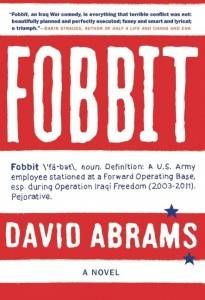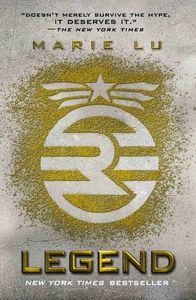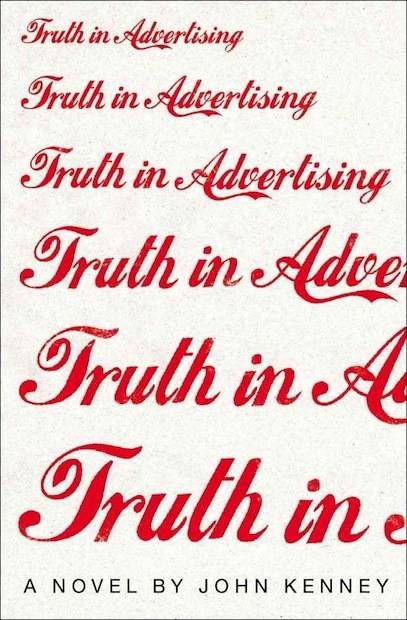
Riot Round-Up: The Best Books We Read in January
We asked our contributors to share the best book they read this month. We’ve got fiction, nonfiction, YA, memoir, and more. Some are old, some are new, and some aren’t even out yet. Enjoy, and please tell us about the highlight of your reading month in the comments.
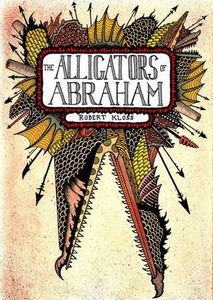
I. Cannot. Stop. Talking. About. This. Book. I love it like Dobby loves socks. I will try and keep my description down to five adjectives: amazing, strange, dark, poetic, beautiful. I’d say haunting, too, even though that adjective is overused. BUT SERIOUSLY. This book – I can’t even. As I told Rebecca, it’s the skull fucking you didn’t know you needed. It’s about the Civil War, but it’s like a fever dream, and there is lots of death, and bones and alligators (natch.) I’ve never read anything like it – I want to drag it down to the bottom of a river in a death roll. (Get it? Like an alligator does to its prey!) I am OBSESSED. Don’t worry, not in a shoot-a-celebrity-and-blame-the-book-way, just a regular old can’t-stop-thinking-about-it way. This book is so unusual and gorgeous (more adjectives!) you don’t even notice the second person narration, which doesn’t always work in a novel (or a blog, or a tweet…) but is perfect in this instance. Step outside your comfort zone, read this book, and remember – if Robert Kloss goes missing, I know nothing.
–Liberty Hardy

What a novel — an experimental one, and a work of documentary fiction, but also just an amazing story. Michael Winter takes the court documents, police records, wiretaps, and more to assemble his story; but this is fiction-as-rapportage with Winter using the actual words from these documents and stitching them together to make the story. It’s a tale that asks really complicated questions about justice and the law, and what happens when one runs afoul of the other. The commitment to individual vernacular and voice means that this could be a textbook for character construction. But it’s mostly just a gripping, fascinating narrative. And Penguin has the whole first chapter online as a PDF, so there’s no reason not to give this novel a gander (or a Gander, NF — cuz that’s a place in Newfoundland, which is where the novel takes place, get it?).
–Brenna Clarke Gray
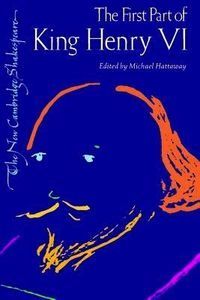
Battle speeches from besieged ramparts. Father and son brandishing swords side-by-side in a fight to the death. Backroom royal intrigue and the seeds of civil war. And Joan of Arc! The First Part of King Henry the Sixth is one of three Shakespeare plays I recently re-read via the Kindle app on my iPhone. And while the other two—King Lear and The Tempest–were probably superior plays, 1 Henry VI (likely the earliest of Shakespeare’s histories) features state-paralyzing partisan strife, truly noble leaders at odds with childish-seeming strivers, and the prioritization of individual ambition and personal power over the welfare of the nation, all set against long-lasting war. Sound familiar? I’ve tried other literary texts on my iPhone—including poetry, which would seem a good fit for the small screen—and haven’t been able to embrace the experience. But it’s been no problem with Shakespeare. The mix of poetry and story and the absolute virtuosity of the language have added a real grace to my recent subway commutes.
–Loyal Miles
I started the year by reading one of our own Rioter’s debut novels. I started and failed to finish a number of titles, and this is the only one that kept me going. I’m going to gush about it another post, so I’ll keep it brief. Fobbit is everything that a great war novel should be – funny, sad, horrible, and conflicted. It may not have the practical joke, one-liner driven humor of M*A*S*H, but it has the same not-always-subtle commentary on how the military operates and war in general. It’s a great read, and that it was written by someone who lived it makes it even better. And I’m super glad that his personal story turned out in such a way that he was able to share this one.
–Cassandra Neace
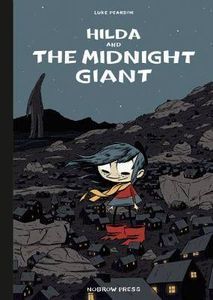
Hilda lives in the fjords and goes on adventures and loves to sleep in a tent outside when it rains so she can appreciate her cozyness. She is my new spirit animal. I was first introduced to Hilda in the short story comic Hildafolk by Luke Pearson from Nobrow. It’s was so charming and sweet and overflowing with child-like wonder that I instantly fell in love. Hilda and the Midnight Giant is Hilda’s first full-length adventure. A strange shadowy giant has been turning up around Hilda’s small cabin each night. On top of that, she’s trying to make peace with a whole country of teeny elves living on her property that are trying to evict her. Basically, it’s just wonderful and adorable and I love it to pieces.
–Ali Colluccio
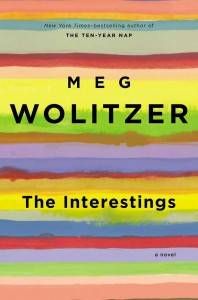
I recently got into Meg Wolitzer after reading her knock-the-wind-right-out-of-you novel The Wife, and was so excited to receive an advance copy of Wolitzer’s next novel (out this April) The Interestings. The novel tells the story of a group of friends who meet as teenagers at a sleepaway arts summer camp in the 1970’s, and follows the friends up through basically today. It’s a novel about what happens to young people who dream of being creative forces in the world and what happens to the group dynamic over the years as dreams are achieved (or not). It’s well-observed and hilarious and just so tragic and one of my new favorite fictional stories about envy in the artistic world (I am a GONER for Amadeus and All About Eve.)
–Kit Steinkellner
I picked up Marie Lu’s novel for work and totally lucked out because it is a fantastic read. Set in a who-knows-maybe-it’s-possible future of a divided America, Legend is the story of two genius 15 year olds brought up on opposite sides of society. Throw in a dash of dystopia, some sketchy plague to society, and of course, romance, and you’ve got a YA hit. I really enjoyed the world that Lu created. Her characters were incredibly intelligent, but not infallible, which made them all the more interesting. The action is as quick as the love story (there is a kiss within two days of the characters meeting! That never happens in the first book anymore!). I thoroughly enjoyed it.
–Preeti Chhibber
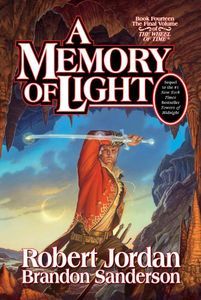
Decades of reading come to an epic end. A Memory of Light is a doorstopper of a book, a literal brick of bound pages that could prop up a bus at the top of a steep hill. The first book in the series was published in 1990, six years after Jordan started writing it. And now, twenty-three years later and, sadly, after the death of the author himself, we have the last book. And it is good. Sanderson (or Jordan, it is hard to tell how much actual control Sanderson has) let a little bit of George R. R. Martin seep in and has finally lost his fear of killing of characters.
The book is as satisfying an ending as one could hope for, with epic battles and fantastic (in every sense of the word) scenes and characters. For fans of fantasy, this is about as good as it gets. That being said, the writing itself is not the finest of literature; Sanderson’s (or is it Jordan’s?) similes are grating and any and all symbolism is beat-the-reader-over-the-head obvious and therefore superfluous. Still. Sanderson did a very good job finishing Mr. Jordan’s series and I for one salute him. Fans will not be disappointed.
–Johann Thorsson
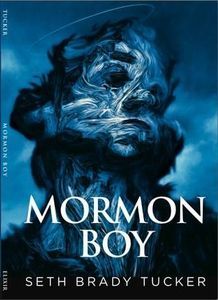
I started the new year by reading Seth Brady Tucker’s debut collection of poetry. As a former paratrooper with the U.S. Army’s 82nd Airborne Division, Tucker writes viscerally about combat (a fellow soldier dies in “a splash of bone and brain”) and wistfully, wittily about love (see “Making Out in Cars with Bucket Seats and Other Tales of Woe”). As you can guess, I was especially drawn to the poems about the Iraq War. That conflict still clings to my skin like desert dust, and Tucker’s stanzas make it even harder to shake. You know what you’re in for right from the opening lines of the very first poem called “The Road to Baghdad” which, he writes, “Is less a road than a floral/collection of spongy and soft/bodies…” Like the work of Brian Turner before him, Tucker has urgent, vital things to tell us about war and we should all sit up and listen.
–David Abrams
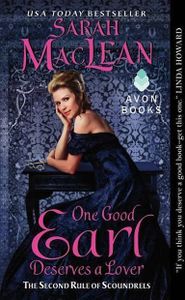
Romance novels are, for me, the book version of ice cream or popcorn: not a full meal, but delicious and satisfying nonetheless. And Sarah MacLean is one of the reasons I read romance at all. Her historical heroines are sassy but still believable, her plotting excellent, and this newest book (the second in the Rule of Scoundrels series) is without a doubt my favorite one yet. Pippa is not just marrying the wrong man — she’s fallen hard for a man she can’t have. A gambling man, no less! Here is a heroine with brains, who relies on logic and education to get her through life, even in the midst of a torrid affair. What’s not to love?
–Jenn Northington
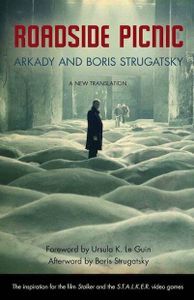
Anyone into SF, Geoff Dyer, or Tarkovsky already knows about this book, which may be the most loved and influential “underground” SF novel ever. First published in 1972, the story involves people living in the strange aftermath of an alien visitation that no one can quite comprehend. The area where their crafts landed has become an off-limits zone which dangerously defies the rules of rational cause and effect and physics as we understand it. The only people allowed to enter the zone are scientists – but a criminal black market group of guides known as Stalkers are willing to lead you in (or get stuff out for you) for a price. This isn’t just the best book I read this month, it’s one of the best SF books I’ve ever read.
–Scott Beauchamp
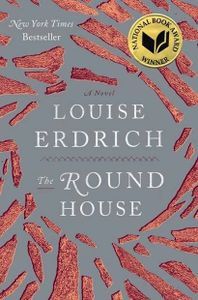
It’s 1988 and thirteen-year-old Joe Coutts is in for one hell of a summer. Right before school lets out his mom is brutally raped and nearly killed at The Round House, a sacred space at the crossroads of federal, state, and reservation land. Over the summer Joe and his trio of friends try to find the rapist and along the way they learn all kinds of things about the darkness of the human heart and the mess history has made of tribal laws. This is one of those books that is so smartly written it’s hard not to want to dissect it and see how Erdrich made it all work, because she teaches you like actual, factual things without ever lecturing. For the reader, much like Joe, the learning comes as a thousand tiny, heartbreaking revelations. So good.
–Jodi Chromey
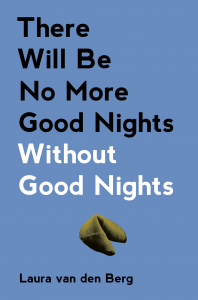
I’ve been a fan of Laura van den Berg’s since her 2009 collection What the World Will Look Like When All the Water Leaves Us, and it remains one of my favorite collections of short fiction, period. In this chapbook–just 36 pages here, folks–van den Berg presents 9 stories that are packed with life and emotion and are also remarkable for their economy of language. In a two-page vignette, she can tell the story of not just a moment but a whole life or relationship. Each story is a scene, or a couple of scenes, but they leave the reader with a full picture of the characters and their lives. These are stories about people who are are looking for something, and their longing is palpable. I can’t remember ever being so affected by such a tiny book, and I’ll be delighting in going back to it over and over again for a long while.
–Rebecca Joines Schinsky
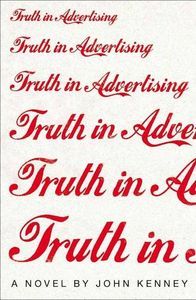
If you’re a fan of Mad Men, but you feel like it’s just a tad too serious, this is the novel for you. Kenney’s debut is a total top-down skewering of the advertising industry, and it’s hilarious. But it’s also a story about a late-30s guy’s “quest” to find himself, amidst a recently failed engagement and the death of his estranged father. Finbar Dolan, our protagonist and first-person narrator, is certainly flawed, and he can be a gaping a-hole from time to time, but you still find yourself on his side. Indeed, this is a novel you’ll gulp down a much for its humor and wit, as the fact that you’re rooting for Fin to yank his head out of his nether regions, and win at life. If you liked Joshua Ferris’s Then We Came To The End, or anything by Jonathan Tropper, you’ll love this book.
–Greg Zimmerman
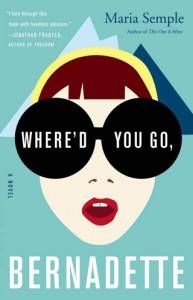
This is a book I’d heard tons of raving about but really had no idea what to expect. It’s about a wealthy ex-architect named Bernadette who doesn’t fit into her neighborhood rich-white-mom-private-school set. She’s haunted by professional failures and personal agoraphobia that culminates in a trip she’s trying to plan to Antarctica with her family (the details of which are being handled by a mysterious virtual assistant overseas). When things start to fall apart, Bernadette disappears and her teenage daughter goes on a quest to find her. It’s a strange, lovely book that (if you can believe it) reminds me of Gone Girl-meets-Shine Shine Shine: it’s all Big Questions About Motherhood and Family And The Personal Need to Create And Stay True To Your Vision and also Smart Ladies Who Go Missing.
–Amanda Nelson

Let me tell you, ask the guy (a guy! always!) at the information kiosk to point you in the direction of this book at a big box bookstore and see which of you sweats more through the armpits as you approach the Self Help/Women’s Issues section.
It’s a Parmesan-y title, cheesy, but like the best parm it will knock your socks off as you furiously grate some of Northrup’s suggestions over the pasta of your life turned upside down by night sweats, panic attacks, hair changes, and cardigans. She’s like an awesome older sister. Isn’t it time to find out what you want? She asks, while offering advice on transdermal progesterone. She meets you where you are, which, in my case, was with a huge backload of laundry to do, and my mascara running down my cheeks.
–Elizabeth Bastos
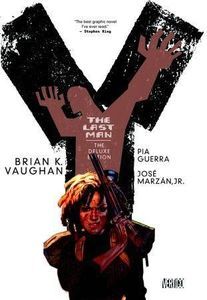
I’ve finally got round to reading Y: The Last Man, a comic series which everyone had already told me was absolutely brilliant. I read it and it turned out…it’s brilliant! It’s even more brilliant than people told me. The premise is simple: something bad has happened (and we are presented with a range of options as to what that bad thing is), and all the males on the planet die, no matter the species…except Yorick Brown and his pet monkey Ampersand. That’s the premise. We then explore what happens next after such a world-shattering event, and we explore it with incredible cleverness and logic, and nail-biting storytelling. It’s the level of cleverness and brilliance that I had hoped for from the Walking Dead TV series but never got from it (sorry). Reading this story an issue at a time would have made my head explode. Also, the monkey is named Ampersand! I wish I had a new pet, just so I could name it that. Or a child, really…
–Peter Damien



